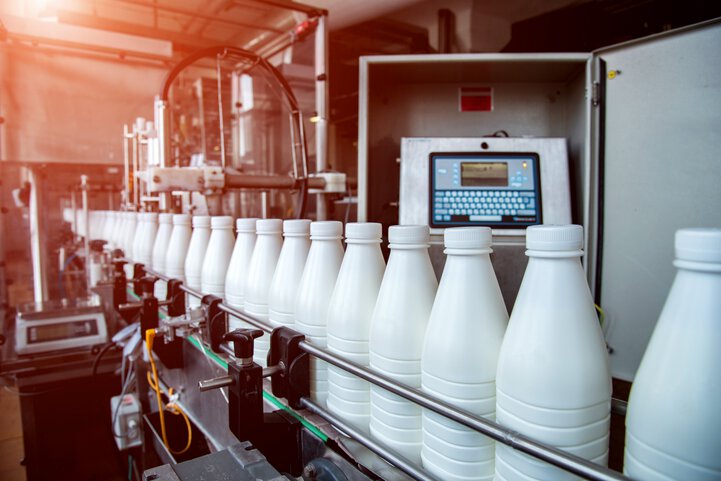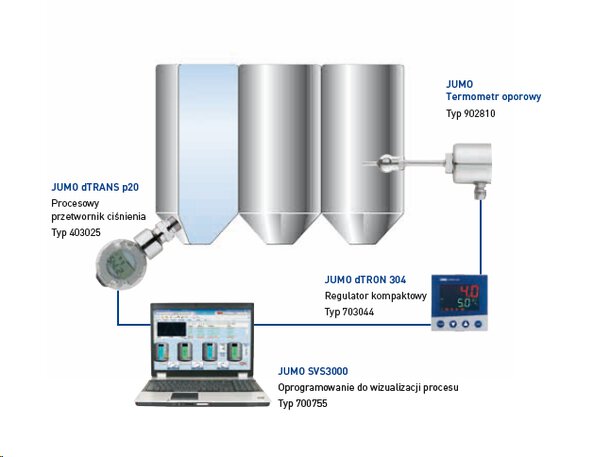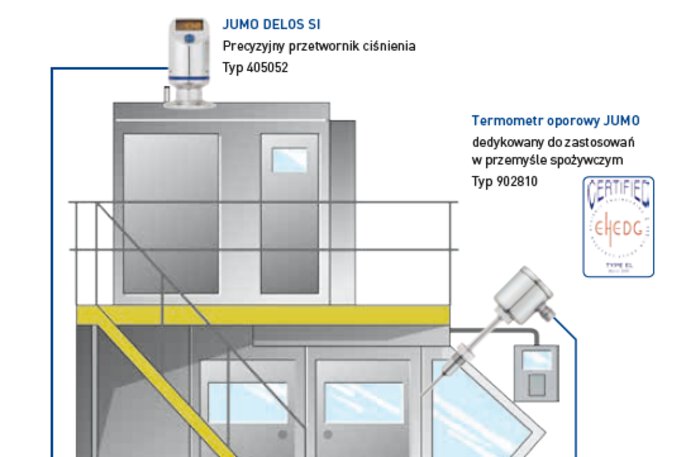

From separation to filling: Pressure measurement in the dairy industry
Did you know that the ideal viscosity of cream depends on the right pressure during homogenisation? And the precise control of temperature and pressure during pasteurisation kills harmful micro-organisms, protecting our health? Milk - a product widely consumed around the world, prized for its taste and nutritional value. Unfortunately, its delicate nature and high susceptibility to spoilage pose a challenge for producers. The short shelf life necessitates fast and efficient processing and storage to keep the product fresh and safe. Fortunately, modern technology brings new opportunities. Modern processing methods, combined with precise pressure measurements, have significantly improved the stability of dairy products. They allow us to enjoy delicious milk, yoghurts, cheeses and other dairy products for longer without worrying about spoilage. In this blog post, we will focus on advanced technologies for monitoring milk tank fill levels using hydrostatic pressure, which represent a breakthrough in milk production quality management. You will learn how state-of-the-art pressure transducers, such as the dTRANS p20, are helping to increase production efficiency while minimising the risk of errors and contamination. In addition, we will discuss the importance of precise pressure control in processes such as homogenisation, which are key to achieving optimal texture and quality in the final dairy product. Continue reading to learn more about these innovative solutions that can change the face of your dairy production.
Monitoring milk tank fill level using hydrostatic pressure
Measuring the fill level of a milk tank is crucial for optimising production and quality control in the dairy industry. Traditional methods, such as visual inspection or float meters, can be unreliable and inaccurate. Therefore, modern measurement methods such as hydrostatic pressure control are now being used. This method is based on measuring the pressure of the fluid with a pressure transducer at different depths of the tank, which allows the precise determination of the filling level. For this application, we recommend the dTRANS p20 process differential pressure transmitter with dairy connection. Made of high-quality stainless steel, with a housing suitable for harsh conditions and limited installation space, this measuring sensor guarantees not only durability but also compliance with hygienic requirements, with a surface roughness of ≤ 0.8μm.

The filling level in both stanrad and sterile tanks is measured based on hydrostatic pressure. For this application, we recommend the dTRANS p20 differential pressure transmitter.
Measuring pressure in skimmed milk run-off after separation
Monitoring the skimmed milk run-off is important to ensure uniform standardisation. Despite possible flow fluctuations after the separation process, it is important that the skimmed milk pressure remains stable. This pressure reflects the flow of milk through the separator and allows detection of potential problems such as nozzle clogging or pump failure. The JUMO DELOS SI precision pressure transmitter proves its worth in this application. With its easy-to-read LCD display, the user can easily keep track of the current pressure and the status of the switches. The device, made of high-quality stainless steel and an external measuring diaphragm without seals, is ideal for applications in the food industry requiring a high level of hygiene.

The high-quality DELOS SI pressure transmitter will prove its worth in the separator due to its hygienic housing and easy-to-read LCD display that allows visualisation of the current process pressure and switching contacts.
Pressure control during milk homogenisation with PID process controller
Precise pressure control and pressure monitoring during the homogenisation process are key to the efficiency and effectiveness of production to achieve the desired end result. For example, in cream production, proper pressure management is essential to regulate the viscosity of the finished product. In this context, the use of the dTRANS p30 pressure transmitter and the DICON touch process controller enables easy pressure control, which is essential in the homogenisation stage. The PID controller allows multiple homogenisers to be connected simultaneously, significantly improving process management.

In the homogenisation process, we recommend pressure control with the DICON touch process controller
Pressure and temperature sensors for pasteurising milk
Pasteurisation is the thermal treatment of milk to destroy harmful micro-organisms, thereby extending its shelf life. A key element of this process is the precise monitoring of pressure and temperature, which allows optimum results and ensures product safety.
Accurate temperature measurement: During pasteurisation, the milk must be heated to a precise temperature for a specific period of time. Accurate temperature monitoring ensures the effective destruction of microorganisms while protecting the milk from overheating, which can adversely affect its taste and consistency. For this purpose, we recommend our resistance temperature sensor for food applications.
Maintaining optimum pressure: The pressure in the pasteurisation chamber must be strictly controlled to prevent milk spillage and to ensure homogeneous processing of the product. Monitoring the pressure allows potential problems such as leaks or valve failures to be detected. The DELOS SI pressure transmitter for the food and pharmaceutical industry will prove its worth here.
The LOGOSCREEN 700 electronic logger is ideal for monitoring temperature and pressure in the pasteurisation process. It complies with EU regulations on the thermal treatment of foodstuffs in accordance with Regulations (EC) No. 852/2004 and 853/2004 issued by the European Commission. An additional advantage of this unit is its stainless steel housing, which provides a higher level of protection.

For the pasteurisation process, we recommend using a system consisting of a resistance thermometer, a pressure transmitter such as the DELOS SI, the dTRON 304 controller and the LOGOSCREEN 700 screen recorder.
Recording of filling conditions via an on-screen recorder
Accurate control of pressure and temperature avoids excessive foaming, spilling of the milk and formation of air bubbles, which can negatively affect the taste and consistency of the product. The highest hygiene requirements are placed on the measurement technology used for this purpose, as filling systems in dairies usually operate under aseptic conditions. Our EHEDG-approved resistance thermometers and DELOS SI hygienic pressure transmitters with hygienic process connections are designed to meet them.
Production in filling systems uses the HTST principle (high temperature/short time), which requires precise control and reliable recording to ensure traceability of aseptic processes. The LOGOSCREEN on-screen recorder ensures proper documentation of these parameters. In the event of any system interruptions, the device with its integrated web server sends immediate e-mail notifications. Thanks to the design solutions used, LOGOSCREEN is resistant to aggressive cleaning agents and meets the stringent hygiene requirements of the food industry.

Filling conditions should be controlled with a precision pressure transmitter such as the DELOS SI and a resistance temperature sensor for food applications. We also recommend the dTRON 304 compact controller and the LOGOSCREEN 700 screen recorder.
The Importance of Accurate Pressure Measurements in Dairy Industry Installations – Summary
Pressure measurement and temperature monitoring during the processes of milk pasteurization and homogenization are crucial elements for ensuring the quality and safety of dairy products. These systems require the measurement technologies used in them to be not only precise but also hygienic and sterile. Pressure transducers, such as DELOS SI and dTRANS p20, are ideally suited for this task due to their durability, accuracy, and resistance to the aggressive production environment. These devices enable accurate pressure measurement and control during key production stages, such as homogenization, where pressure adjustment affects the viscosity of the final product, and pasteurization, where precise pressure maintenance is essential for effectively destroying microorganisms without degrading milk quality. Achieving the desired final effect is also ensured by the programmable PID controller DICON touch, which allows simultaneous control of multiple homogenizers.
Additionally, in the case of aseptic filling, where HTST (high temperature/short time) methods are used, proper recording and control of processes are fundamental for maintaining traceability and meeting regulatory requirements. Screen recorders, such as JUMO LOGOSCREEN nt, not only provide documentation of processes in tough industrial conditions but also ensure compliance with European Union standards regarding thermal processing of food.
These technologies are indispensable in modern dairies that prioritize automation and high production standards, minimizing the risk of human error and increasing production efficiency. By using advanced sensors, transducers, controllers, and recorders, processes such as pasteurization, homogenization, and filling become more controlled, which translates to higher quality and safety of dairy products.

Technical specialist
Jakub Dąbrowski - Inside Sales Engineer +48882351471 Jakub.Dabrowski@JUMO.net +48882351471Comments
We encourage you to leave your comments via the form below. They will be posted online once they have been approved through our review process.


